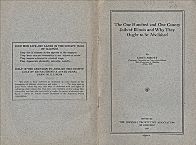| Entries |
| J |
|
Juvenile Protective Association
|

|
Bibliography
Addams, Jane.
The Spirit of Youth and the City Streets.
1909.
Bowen, Louise de Koven.
Safeguards for City Youth: At Work and at Play.
1914.
Willrich, Michael.
City of Courts: Socializing Justice in Progressive Era Chicago.
2003.
The Electronic Encyclopedia of Chicago © 2005 Chicago Historical Society.
The Encyclopedia of Chicago © 2004 The Newberry Library. All Rights Reserved. Portions are copyrighted by other institutions and individuals. Additional information on copyright and permissions.
The Encyclopedia of Chicago © 2004 The Newberry Library. All Rights Reserved. Portions are copyrighted by other institutions and individuals. Additional information on copyright and permissions.